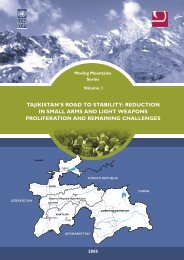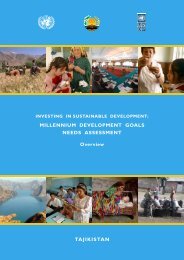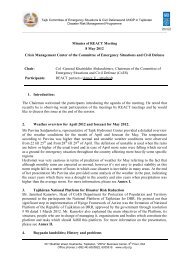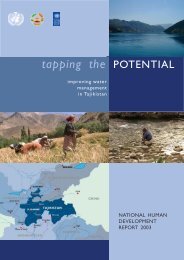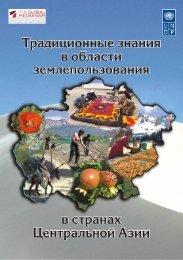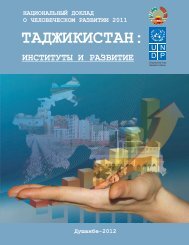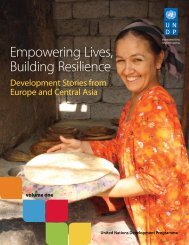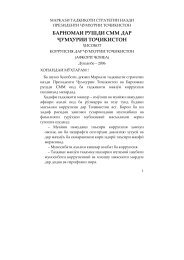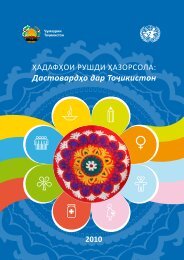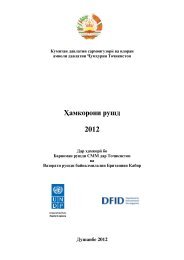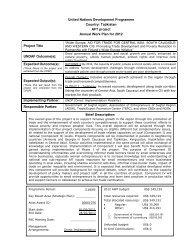Eng - UNDP in Tajikistan
Eng - UNDP in Tajikistan
Eng - UNDP in Tajikistan
You also want an ePaper? Increase the reach of your titles
YUMPU automatically turns print PDFs into web optimized ePapers that Google loves.
DEVELOPMENT PARTNER PROFILE<br />
Multilateral<br />
United Nations Population Fund<br />
Contact: Mr. Michael Jones<br />
Resident Coord<strong>in</strong>ator of UNFPA<br />
Tel: 441-06-90 Fax: 441-06-46<br />
E-mail: unfpa.tj@undp.org<br />
Website: www.untj.org<br />
Organization Profile<br />
UNFPA, the United Nations Population Fund, is an <strong>in</strong>ternational development agency that promotes the right of every woman, man and child<br />
to enjoy a life of health and equal opportunity. UNFPA supports countries <strong>in</strong> us<strong>in</strong>g population data for policies and programmes to reduce<br />
poverty and to ensure that every pregnancy is wanted, every birth is safe, every young person is free of HIV/AIDS, and every girl and woman<br />
is treated with dignity and respect.<br />
Past and Current Programmes<br />
UNFPA support to <strong>Tajikistan</strong> was <strong>in</strong>itiated under a subregional programme from 1995 to 1999. UNFPA and Government of <strong>Tajikistan</strong><br />
developed first country programme (2000-2004) <strong>in</strong> the amount of US$ 3.05 million. The focus of the first country programme was to <strong>in</strong>crease<br />
the utilization of <strong>in</strong>tegrated, gender-sensitive and high quality reproductive health services, especially among rural and underserved<br />
populations.<br />
The second country programme was developed 2005-2009 <strong>in</strong> the amount 2,6 million. Ongo<strong>in</strong>g UNFPA programme contributes to poverty<br />
reduction by focus<strong>in</strong>g on reproductive health and family plann<strong>in</strong>g, population and development strategies, and women's empowerment.<br />
Proramme <strong>in</strong>tervantions focus on geographical area such as Soghd oblast <strong>in</strong> the north, and selected districts of Khatlon oblast <strong>in</strong> the south.<br />
Future Programm<strong>in</strong>g Direction<br />
The UNFPA office will cont<strong>in</strong>ute to focus on the areas conicide<strong>in</strong>g with its mandate. In particular the follow<strong>in</strong>g activities are planned for this<br />
year (2008): (1) capacuty build<strong>in</strong>g of statistical and Primary Health Care facililties <strong>in</strong> analysis, usage and communication of the RH statistical<br />
<strong>in</strong>formation; (2) support the CPD mandated to coord<strong>in</strong>ate <strong>in</strong>tersectoral mechanism and promotes the use of data <strong>in</strong> monitor<strong>in</strong>g and evaluation<br />
of national frameworks, especially targets related to RH; (3) support to <strong>Eng</strong>lish proficiency courses for students/faculty members of TSNU<br />
and staff of the State Statistic Committee; (4) publication of a package of youth friendly, gender sensitive materials; (5) <strong>in</strong>troduction of a<br />
package of youth friendly <strong>in</strong>formation <strong>in</strong> non-formal sett<strong>in</strong>gs and schools/universities through face-to-face communication (6) <strong>in</strong>troduc<strong>in</strong>g<br />
family life education and youth friendly <strong>in</strong>formation <strong>in</strong>to curricula of secondary schools; (7) <strong>in</strong>volvement of the religious leaders <strong>in</strong>to the<br />
promotion of the SRH/RR and HIV/AIDS prevention issues among adolescents and <strong>in</strong>troduction of family plann<strong>in</strong>g <strong>in</strong>to the curricular of the<br />
Islamic educational <strong>in</strong>stitutions; (8) conduct<strong>in</strong>g a mass media campaigns on HIV prevention through out the country; (9) development of the<br />
Y-peer network <strong>in</strong> <strong>Tajikistan</strong>; (10) complet<strong>in</strong>g the KAPB survey; (11) advocacy workshop on ICPD; (12) workshop on GBV prevention;<br />
(13)“Beyond the Numbers” <strong>in</strong>itiative review<strong>in</strong>g maternal deaths and complications to make pregnancy safer; (14) technical workshops on<br />
cl<strong>in</strong>ical protocols; d) EmOC field assessment visits; (15) tra<strong>in</strong><strong>in</strong>g on Colposcopy; (16) workshops on counsel<strong>in</strong>g for midwifes (based on the<br />
who guidel<strong>in</strong>es “Medical Eligibility Criteria for Contraceptive Use” and “Selected Practice Recommendations for Contraceptive Use”; (17)<br />
support to participation of the MOH staff at the International conferences; (18) establish<strong>in</strong>g a RHCS, <strong>in</strong>clud<strong>in</strong>g CLMIS monitor<strong>in</strong>g and<br />
evaluation mechanism <strong>in</strong> l<strong>in</strong>e with the provisions of the MoH RH Strategy Action Plan; (19) <strong>in</strong>troduction and monitor<strong>in</strong>g of the use of<br />
CHANNEL; (20) secur<strong>in</strong>g necessary RH related equipment, contraceptive supplies and registers.<br />
Source: Aid Coord<strong>in</strong>ation and Project Monitor<strong>in</strong>g System Database<br />
© State Committee on Investments and State Property Management of the RT<br />
116




